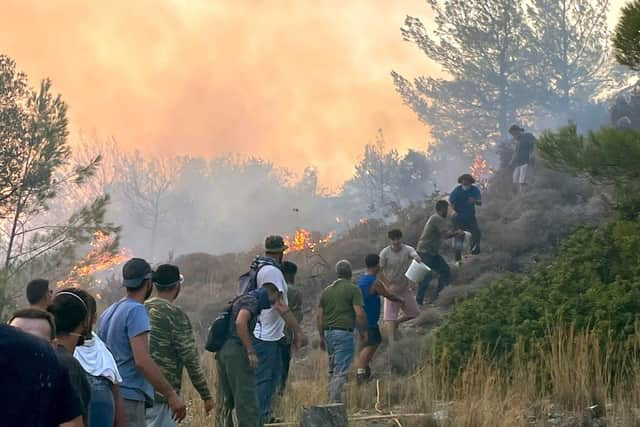Britain is good at innovation so it should be leading from the front on decarbonisation - Andy Brown
Before science came along no one understood electricity, most of the elements in the periodic table were unknown and the common sense assumption was that the sun must go round the earth.
So scientific observation and repeatable experiments which continually produce the same results need treating with respect.
Advertisement
Hide AdAdvertisement
Hide AdWe know from experiments conducted in endless laboratories, and which any competent scientist can check, that if you increase the proportion of carbon dioxide in the air then it traps more heat. Science can also measure the quantities of carbon dioxide that existed at different times in the past using a variety of equally reliable techniques.


These measurements have revealed that there were around 250 parts per million of carbon dioxide in the atmosphere at the start of the industrial revolution. The figure for 2022 was 417. That means a lot of extra heat trapped in the atmosphere and science also tells us that if you put more energy into any system then it powers change.
How fast that change happens and the exact nature of it becomes much more difficult to predict when you are dealing with something as complex as the atmosphere. It is, however, beyond doubt that increased quantities of CO2 are a direct result of human activity and represent a dangerous experiment with the only planet we have.
It has become fashionable in some quarters to argue that those risks aren’t that significant and we can take our time before acting seriously. The evidence is increasingly pointing in the opposite direction. What is happening to the earth’s climate seems to be taking place faster than the models that we’ve been relying on and the consequences of the temperature rises that we’ve seen so far seem to be more extreme.
Advertisement
Hide AdAdvertisement
Hide AdThis year has seen temperature records broken across almost the whole of Southern Europe and holiday makers in Rhodes fleeing for their lives from forest fires. Then there were deadly fires in Hawaii. In Canada fires have covered an area the size of Britain and new ones are still breaking out.
Warm air captures more moisture and the consequence has been widespread flooding across huge areas of China and India, in Frankfurt and Slovenia and even in bone dry Death Valley in California.
The average temperature across the whole of the North Atlantic has reached record highs whilst the temperatures in Antarctica have exceeded levels that would happen by random chance once every 13,000,000,000 years. As a consequence less ice is forming there and ice reflects sunlight and helps cool the earth.
The cost of not acting quickly enough on the climate crisis is starting to mount. Floods, fires and high winds carry a heavy price both in terms of human lives and in clean-up costs. They also make food production a lot more difficult and more unreliable. Which means higher food prices. Britain would be wiser to put a lot more effort into supporting our farmers to grow more locally produced food more sustainably instead of relying on cheap imports.
Advertisement
Hide AdAdvertisement
Hide AdThere is something deeply strange about fuelling our entire civilisation on the burning of fossils. It took millions of years to lay those fossils down and we’ve been finding them and burning them at scale for just a couple of centuries. It is a scientific fact that such a lifestyle cannot be sustained into the long term.
Faced with the need for change there are two typical responses. One is to try and cling on to the old familiar ways of doing things. Just as the Chinese emperors did when Britain launched the industrial revolution. The result was Britain became wealthy and China became very poor.
The other approach is to embrace the change and to try and be at the forefront of it. Right now most of the major world economies are pouring money into trying to be successful in a new era of decarbonised technology.
In the US $500,000,000,000 is being pumped into an inflation reduction scheme that is designed to cut energy use, increase investment in research and development, commercialise cutting edge technologies and boost domestic manufacturing capacity. Much the same is being done in China, the EU and India.
Advertisement
Hide AdAdvertisement
Hide AdIn Britain we have seen a steady decline in our manufacturing industries as we have relied on decades of easy money from North Sea fossil fuels. In Norway they are emerging from the fossil fuel era with a huge sovereign wealth fund that is being used to invest in the future. In Britain we will be trying to emerge with the burden of huge debts.
The main advantage we do have is a very well educated population that is good at innovation and some brilliant scientific research departments in our Universities.
Andy Brown is the Green Party Councillor for Aire Valley in North Yorkshire.